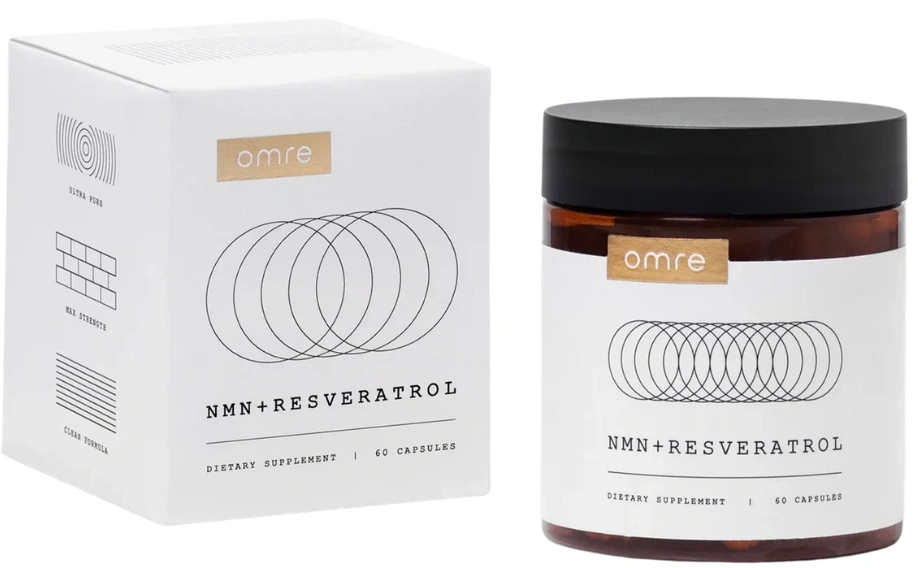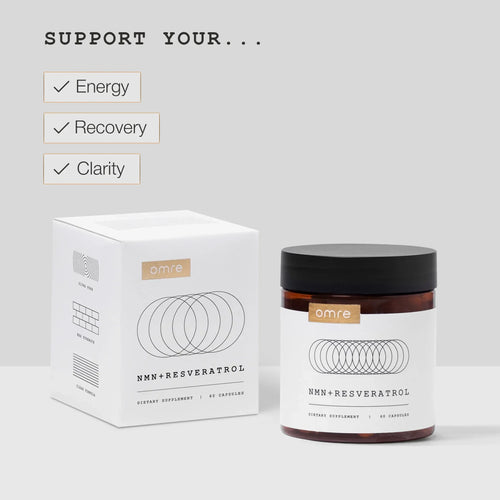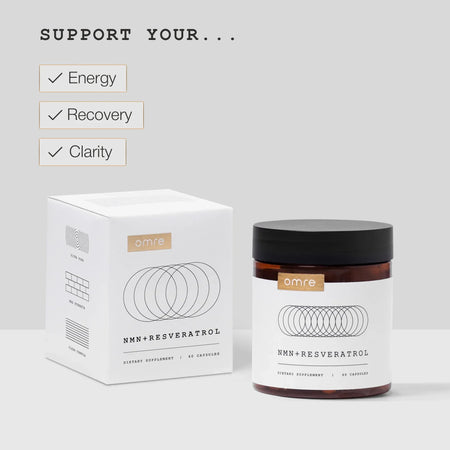Table of Contents
- TL;DR
- What is Calcium Alpha-Ketoglutarate (Ca-AKG)?
- Ca-AKG vs AKG: What’s the Difference?
- How Does Ca-AKG Work?
- How Ca-AKG Supports Longevity at the Cellular Level
- Top Potential Benefits of Ca-AKG for Healthy Aging
- What Research Says About Ca-AKG for Healthy Aging
- How to Incorporate Ca-AKG into Your Routine
- When and How to Take Ca-AKG for Best Results
- Potential Side Effects of Ca-AKG Supplements
- A Better Alternative Supplement for Healthy Aging
- Conclusion
- FAQs
Calcium Alpha-Ketoglutarate (Ca-AKG) is a stabilized form of a natural compound that helps your body produce energy, repair cells, and manage aging.
As levels decline with age, supplementing with Ca-AKG may support mitochondrial function, reduce inflammation, and promote a longer, healthier life.
Here’s a clear breakdown of how Ca-AKG works, its key benefits, recommended dosage, and what to consider before adding it to your wellness routine.
NMN + RESVERATROL
Cellular NAD+ booster with ultra‑pure NMN and Resveratrol, at research‑backed doses.*
TL;DR
Calcium Alpha-Ketoglutarate (Ca-AKG) is a stable, bioavailable form of AKG that supports energy production, cellular repair, and healthy aging. It may improve mitochondrial function, reduce inflammation, and slow age-related decline by targeting key pathways like mTOR and AMPK.
While most evidence comes from animal studies, early research suggests Ca-AKG may help extend lifespan and healthspan. It’s typically taken in the morning, is well-tolerated by most people, and may be a useful addition to a long-term wellness routine.
What is Calcium Alpha-Ketoglutarate (Ca-AKG)?
Calcium Alpha-Ketoglutarate (Ca-AKG) is a stabilized form of alpha-ketoglutarate, a naturally occurring compound in the body that plays a key role in energy production, cellular health, and metabolism.
As we age, the body's production of AKG declines significantly, making supplementation a potential way to address some of the effects of aging.
In its natural form, AKG supports cell renewal and helps fuel various bodily processes during growth and recovery. It also plays a role in protein synthesis and supports digestive and kidney function.
However, by the time we hit 80, AKG levels in the body are just 10% of what they were at 40, making supplementation an intriguing option for those looking to maintain health as they age (1).
The calcium-stabilized version, Ca-AKG, enhances the compound’s bioavailability and ensures it can be absorbed more effectively by the body.
This makes it a practical way to harness the benefits of AKG, which research suggests may contribute to better overall health and reduced frailty in older individuals.
Ca-AKG vs AKG: What’s the Difference?
 While both AKG and Ca-AKG are used for healthy aging, they aren’t the same. Here’s a quick breakdown:
While both AKG and Ca-AKG are used for healthy aging, they aren’t the same. Here’s a quick breakdown:
How Does Ca-AKG Work?
Ca-AKG works by supporting cellular energy production, promoting cell renewal, and reducing age-related inflammation. It acts as a kind of cellular "fuel," helping to keep your body's engines running smoothly, especially as natural AKG production decreases with age.
On a deeper level, Ca-AKG influences processes like protein synthesis and DNA repair. It also acts as a nitrogen scavenger, helping to prevent muscle breakdown and support tissue growth.
For those concerned about inflammation, studies have found that Ca-AKG may reduce chronic inflammation caused by aging cells, improving overall cellular health.
Additionally, research suggests that Ca-AKG might play a role in longevity by targeting pathways like TOR (target of rapamycin), a critical regulator of cell growth and metabolism (2).
This has led to promising results in studies with animals, though further human research is needed.
How Ca-AKG Supports Longevity at the Cellular Level
Calcium Alpha-Ketoglutarate (Ca-AKG) works by targeting key processes involved in aging. As a core molecule in the citric acid cycle, it fuels mitochondrial function, the powerhouse of your cells. This helps maintain energy metabolism, which often declines as we age.
Ca-AKG also influences important cellular pathways like mTOR and AMPK. Inhibiting mTOR has been linked to increased lifespan and reduced age-related diseases, while activating AMPK supports healthy energy balance and promotes cellular repair.
Another major benefit? Ca-AKG helps reduce cellular senescence. These are "zombie" cells that no longer divide and can cause inflammation and tissue damage. By reducing their impact, Ca-AKG may improve tissue function and slow down the aging process.
Together, these mechanisms support healthier aging at the molecular level, helping your body stay more resilient, energetic, and balanced as the years go by.
Top Potential Benefits of Ca-AKG for Healthy Aging
-v1750197021362.webp) Many studies on Ca-AKG have been conducted on animals and in laboratory settings, and while these findings are promising, more human research is needed to fully understand its effects. Here’s what researchers have discovered so far:
Many studies on Ca-AKG have been conducted on animals and in laboratory settings, and while these findings are promising, more human research is needed to fully understand its effects. Here’s what researchers have discovered so far:
May support digestive health: Research indicates that Ca-AKG might help protect the intestines from tissue breakdown, even in challenging conditions like a low-protein diet (3). This suggests it could play a role in maintaining a healthy digestive system as we age.
Might reduce age-related inflammation: Studies suggest that Ca-AKG could lower levels of inflammation markers often associated with aging (4). By reducing these markers, it may support overall health and longevity, helping the body feel and function better for longer.
Could enhance metabolism: Ca-AKG may improve how the body processes amino acids and reduce the buildup of ammonia, a byproduct of metabolism that can be harmful in excess (5). This could help support energy levels and overall metabolic health.
May extend lifespan: Animal studies, including those on worms and mice, have shown that Ca-AKG supplementation was associated with a noticeable increase in lifespan (6). It’s believed this effect is related to the compound's ability to support cellular health and reduce the impacts of aging at a molecular level.
Might improve overall quality of life: Research suggests Ca-AKG may contribute to better DNA repair and reduced frailty, which are important for maintaining strength, mobility, and vitality as we age (7). It’s not about reversing aging but helping individuals age more healthfully.
While these potential benefits are exciting, they should be approached as part of a broader strategy for healthy aging that includes good nutrition, exercise, and other proven lifestyle choices.
NMN + RESVERATROL
Cellular NAD+ booster with ultra‑pure NMN and Resveratrol, at research‑backed doses.*
What Research Says About Ca-AKG for Healthy Aging
Several studies in animals and early human trials suggest that Ca-AKG may help extend both lifespan and healthspan.
A 2020 study from the Buck Institute showed that mice given Ca-AKG lived up to 16% longer and remained healthier during aging, with improved activity and reduced frailty markers (8).
Researchers believe the effects are tied to Ca-AKG’s impact on inflammation, mitochondrial health, and gene regulation. It appears to reduce senescent cell burden and improve how cells repair themselves, especially under metabolic stress.
Ca-AKG also supports DNA methylation, an important epigenetic process that helps regulate how genes are expressed. Balanced methylation patterns have been linked to slower biological aging.
While more long-term human research is needed, these findings make Ca-AKG a promising tool for supporting healthy aging from the inside out.
How to Incorporate Ca-AKG into Your Routine
Adding Ca-AKG to your daily life can be straightforward, with several supplement options available in powder or capsule form. It’s often taken in the morning with water or a light meal for better absorption.
Start with the dosage recommended on the product packaging or consult a healthcare professional for guidance tailored to your needs. Since Ca-AKG supplements are generally well-tolerated, they can easily fit into most routines without causing disruptions.
It’s important to maintain a balanced diet and active lifestyle to maximize the benefits of Ca-AKG. Supplements work best when combined with habits that support overall health.
While Ca-AKG is considered safe for most people, some may experience mild gastrointestinal discomfort (9). Pregnant or breastfeeding individuals and those with pre-existing medical conditions should consult a doctor before use.
When and How to Take Ca-AKG for Best Results
The best time to take Ca-AKG is usually in the morning, ideally on an empty stomach or with a light meal. This timing helps your body absorb and utilize the compound more efficiently throughout the day.
Here are a few quick tips for Ca-AKG supplement timing:
Morning use is ideal for energy support and aligning with your body's natural repair cycles.
Take with water and avoid heavy meals right after, as fat-rich foods may slow absorption.
Stick to the recommended Ca-AKG dosage on your product label, often between 300–1,000 mg daily.
Split dosing isn’t usually needed, as Ca-AKG has a longer activity window due to its slow-release form.
If you're just getting started, begin with a lower dose and see how your body responds. Most people tolerate it well, but always check with a healthcare provider, especially if you’re on medication or managing a health condition.
Potential Side Effects of Ca-AKG Supplements
Ca-AKG supplements are generally considered safe, but like any supplement, they can affect people differently. It’s a good idea to understand the possible side effects and when to talk to your doctor.
Here are a few things to watch out for:
Digestive issues like nausea, stomach cramps, or diarrhea may happen at higher doses. Starting with a lower dose and increasing slowly can help.
Individual responses vary. What works well for one person might not suit another, so pay attention to how your body reacts.
Kidney health should be considered. People with kidney conditions should speak to a doctor first, as Ca-AKG may put extra stress on the kidneys.
Medication interactions are possible. If you're taking prescriptions, especially those affecting metabolism or kidney function, check with a healthcare provider before starting.
Allergic reactions are rare but possible. Stop taking it if you notice itching, rash, or swelling.
Long-term safety hasn’t been fully studied in humans. Until more research is available, use moderate doses and avoid taking it for long periods without medical advice.
A Better Alternative Supplement for Healthy Aging
If you’re exploring other options alongside Ca-AKG, Nicotinamide Mononucleotide (NMN) is worth considering. NMN has been extensively researched for its role in boosting NAD+ levels, a molecule critical for energy production and cellular repair.
Studies show that NMN supplementation may enhance metabolism, improve mitochondrial function, and support healthy aging.
Compared to Ca-AKG, NMN has a larger body of human studies supporting its benefits, making it a well-trusted option for those seeking a more researched approach to anti-aging.
Choosing between these supplements depends on your specific goals, but some individuals use them together for complementary effects.
When selecting a supplement, quality and transparency are key. Look for products with high purity, clear labeling, and third-party testing to ensure you’re getting a reliable product.
For a trusted NMN supplement, consider Omre NMN + Resveratrol. With ultra-pure ingredients, each serving includes 500mg of NMN and 500mg of Resveratrol, supported by BioPerine® for improved absorption.
This combination supports NAD+ production and activates sirtuins, essential for cellular health and longevity.
With no fillers and research-backed doses, it’s a great choice for those looking to optimize their supplement routine.
Conclusion
Calcium Alpha-Ketoglutarate (Ca-AKG) is a promising compound for supporting healthy aging, with benefits ranging from reduced inflammation to improved metabolism and quality of life.
While more human studies are needed, its potential makes it a valuable addition to any wellness routine.
For those seeking an alternative or complementary option, Omre NMN + Resveratrol offers a high-quality supplement that addresses similar goals with a strong research foundation.  Check the availability to explore its benefits today and take a step toward healthier aging!
Check the availability to explore its benefits today and take a step toward healthier aging!
FAQs
Are there any side effects of taking Ca-AKG?
Ca-AKG is generally well-tolerated, but some individuals may experience mild gastrointestinal discomfort. It’s best to consult with a healthcare professional before starting any new supplement, especially if you have a pre-existing condition.
What does Calcium Alpha-Ketoglutarate do in the body?
Calcium Alpha-Ketoglutarate (Ca-AKG) helps your body produce energy, supports mitochondrial function, and plays a role in removing cellular waste like excess ammonia. It also supports protein synthesis, tissue repair, and may help reduce inflammation and oxidative stress as you age.
Is Ca-AKG safe for long-term use?
Early studies suggest Ca-AKG is generally safe and well-tolerated, even with long-term use. Most people don’t report side effects, though some may experience mild digestive discomfort. It’s still a good idea to check with a healthcare provider, especially if you have medical conditions or take medications.
Can Ca-AKG really slow aging?
Ca-AKG may help slow some aspects of biological aging by improving energy metabolism, reducing inflammation, and supporting DNA repair. Animal studies show longer lifespan and better health markers, but more human research is needed to confirm the full effects.
What’s the best time to take Ca-AKG?
The best time to take Ca-AKG is in the morning, preferably with water and a light meal. This timing helps your body absorb it efficiently and align with your natural energy and repair cycles throughout the day.





